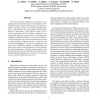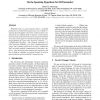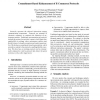HUC
1999
Springer
14 years 4 months ago
1999
Springer
Abstract. The Internet has engendered a new type of commerce, commonly referred to as electronic commerce, or eCommerce. But despite the phenomenal growth of eCommerce, the vast ma...
SRDS
1999
IEEE
14 years 4 months ago
1999
IEEE
In order for mobile agents to be accepted as a basic technology for enabling electronic commerce, proper security mechanisms must be developed. Hosts must be protected from malici...
SRDS
1999
IEEE
14 years 4 months ago
1999
IEEE
In our paper we argue that the building of trust in electronic commerce depends only partly on technical security and the knowledge of security gaps and ways of closing them. It i...
RIDE
1999
IEEE
14 years 4 months ago
1999
IEEE
The Internet and the proliferation of inexpensive computing power in the form of clusters of workstations or PCs provide the basic hardware infrastructure for business to business...
ECMAST
1999
Springer
14 years 4 months ago
1999
Springer
The objectives of the CATI project (Charging and Accounting Technology for the Internet) include the design, implementation, and evaluation of charging and accounting mechanisms f...
HICSS
1999
IEEE
14 years 4 months ago
1999
IEEE
The members of electronic communities are often unrelated to each other, they may have never met and have no information on each other's reputation. This kind of information ...
HICSS
1999
IEEE
14 years 4 months ago
1999
IEEE
What EDI needs is a good semantics, that is, a workable formal theory of what EDI messages mean. As is widely recognized, the point applies to electronic commerce and to communica...
SIGECOM
1999
ACM
14 years 4 months ago
1999
ACM
A major impediment to using recommendation systems and collective knowledge for electronic commerce is the reluctance of individuals to reveal preferences in order to nd groups of...
FTDCS
1999
IEEE
14 years 4 months ago
1999
IEEE
The paradigm of mobile agents reached its popularity and attraction from typical application scenarios, which are located in the area of electronic commerce. In these common appli...
WETICE
2000
IEEE
14 years 4 months ago
2000
IEEE
Protocols represent the allowed interactions among communicating components. Protocols are essential in electronic commerce to constrain the behaviors of autonomous entities. Trad...



